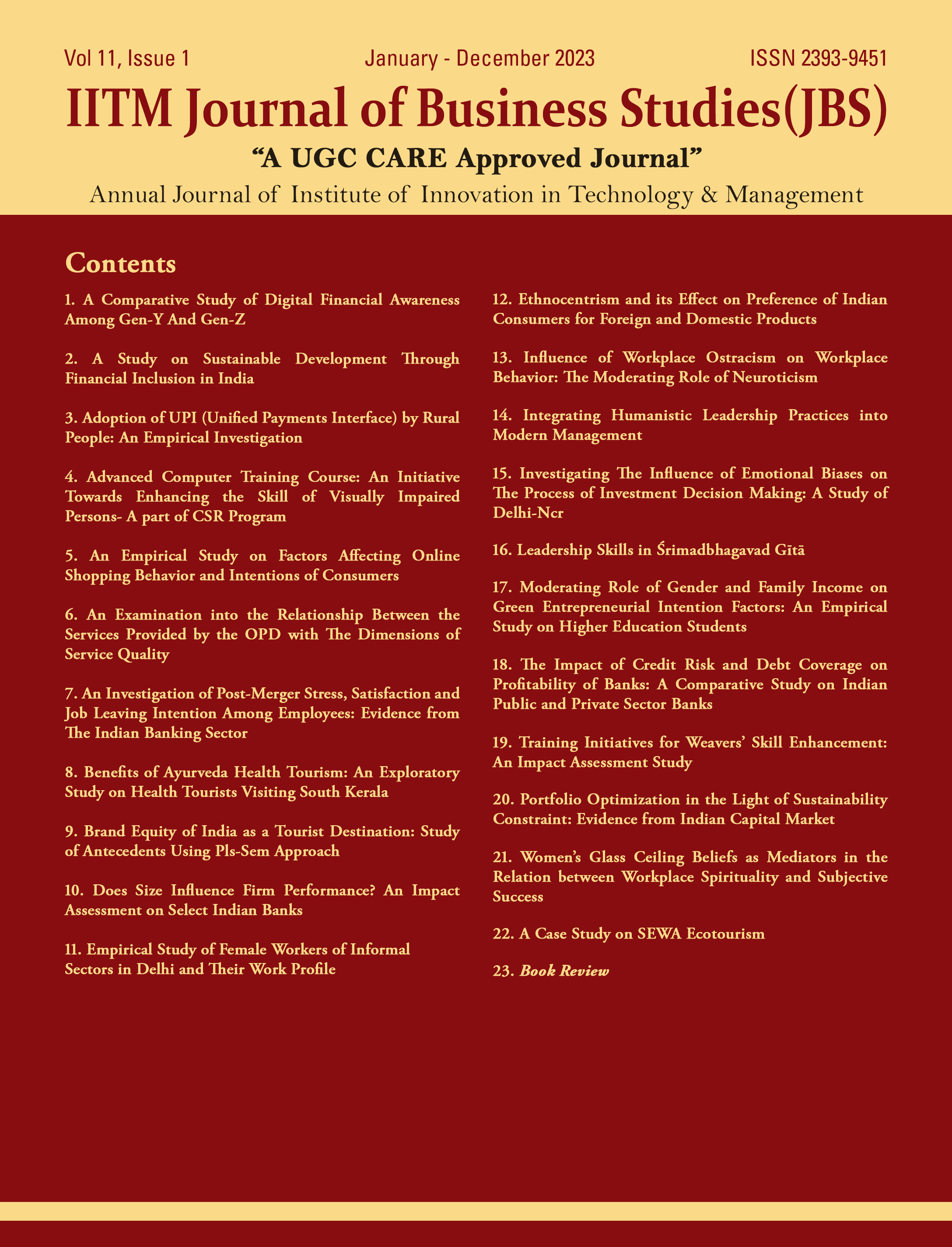A study of psychological empowerment and its impact on job engagement of visually impaired employees during COVID-19 Lockdown
Keywords:
empowerment, interviews, scientificAbstract
This scientific investigation attempt’s by differently-abled employees began as a quest into their own psychological empowerment. The authors attempted to study the relationship between psychological empowerment of differently-abled ( visually impaired) employees and their work engagement across different sectors in India during CIVID19 lockdown. The research design employed both quantitative and qualitative data through surveys and interviews. Results indicate a significant relationship between psychological empowerment and work engagement. The study has implications for human resource professionals, managers and researchers.
References
A, P., & Souza Vidya vinutha, D. (2019). Inclusive workplace-A fair shot for disabled. Inclusive Workplace-A Fair Shot for Disabled, 8(2), 411–419.
Adhitama, J., &Riyanto, S. (2020). Maintaining Employee Engagement and Employee Performance during Covid-19 Pandemic at PT KoeximMandiri Finance. Journal of Research in Business and Management, 8(3), 06–10.
Aggarwal, A., Chand, P. K., Jhamb, D., & Mittal, A. (2020). Leader–Member Exchange, Work Engagement, and Psychological Withdrawal Behavior: The Mediating Role of Psychological Empowerment. Frontiers in Psychology. https://doi.org/10.3389/fpsyg.2020.00423.
Ahlquist, S. (2020). Negotiating human engagement and the fixity of COMPUTATIONAL DESIGN: Toward a Performative design space for THE differently-abled bodymindhttps://journals.sagepub.com/ doi/full/10.1177/1478077120919850.
Armstrong, M., & Taylor, S. (2014). Armstrong’s Handbook of Human Resource Management Practice. London, UK: Kogan Page Ltd.
Ashforth, B. E. (1989). The experience of powerlessness in organization-organizational Behaviour and human Decision processes, 43:207-242.
Chanana, N., &Sangeeta. (2020). Employee engagement practices during COVID‐19 lockdown. Journal of Public Affairs, 1–8. https://doi.org/10.1002/pa.2508.
Chartered Institute of Personnel and Development. (2006). How engaged are British employees? London, UK: Chartered Institute of Personnel and Development (CIPD).
Clayton, S., Barr, B., Nylen, L., Burström, B., Thielen, K., Diderichsen, F., Dahl, E., & Whitehead, M.
(2011). Effectiveness of return-to-work interventions for disabled people: a systematic review of government initiatives focused on changing the behaviour of employers. European Journal of Public Health, 22(3), 434–439. https://doi.org/10.1093/eurpub/ckr101.
Conger, J. A., &Kanungo, R. N. 1988. The empowerment process: Integrating theory and practice Academy of Management Review 13:471-482.
Dursin, A. G. (2012). Information Design and Education for Visually Impaired and Blind People. Procedia - Social and Behavioral Sciences, 46, 5568–5572. https://doi.org/10.1016/j.sbspro.2012.06.477. 12. Elsafty, A., &Ragheb, M. (2020). The Role of Human Resource Management Towards Employees Retention During Covid-19 Pandemic in Medical Supplies Sector - Egypt. Business and Management Studies, 6(2), 50. https://doi.org/10.11114/bms.v6i2.4899
Hendriyani, H., Sudargo, T., Lusmilasari, L., Helmyati, S., Susetyowati, S., &Nindrea, R. (2021). Complementary feeding self-efficacy: A concept analysis. https://oamjms.eu/index.php/mjms/article/ view/3326.
Jayathilaka, A. (2020). Employing Differently Abled ShopFloor Employees in Confectionery Industry in Sri Lanka: An Ethnographic Narrative. Open Journal of Business and Management, 8, 2472-2479. https://doi.org/10.4236/ojbm.2020.86153.
Lindsay, S., Cagliostro, E., Albarico, M., Mortaji, N., & Karon, L. (2018). A Systematic Review of the Benefits of Hiring People with Disabilities. Journal of Occupational Rehabilitation, 28(4), 634–655. https://doi.org/10.1007/s10926-018-9756-z
Maan, A. T., Abid, G., Butt, T. H., Ashfaq, F., & Ahmed, S. (2020a). Perceived organizational support and job satisfaction: a moderated mediation model of proactive personality and psychological empowerment. Future Business Journal, 6(1), 1–12. https://doi.org/10.1186/s43093-020-00027-8. 17. Macey, W., & Schneider, B. (2008). The Meaning of Employee Engagement. Industrial and Organizational Psychology, 1(1), 3-30. https://doi.org/10.1111/j.1754-9434.2007.0002. 18. MacLeod, D., & Clarke, N. (2011). Engaging for success: enhancing performance through employee engagement, a report to Government. London, UK: Department for Business, Innovation and Skills. http:// www.bis.gov.uk/files/file52215.Pdf.
NGUYEN, L. G. T., & PHAM, H. T. (2020). Factors Affecting Employee Engagement at Not-For Profit Organizations: A Case in Vietnam. The Journal of Asian Finance, Economics and Business, 7(8), 495–507. https://doi.org/10.13106/jafeb.2020.vol7.no8.495.
Richard, S., & Hennekam, S. (2020). When Can a Disability Quota System Empower Disabled Individuals in the Workplace? The Case of France. Work, Employment and Society,. https://doi. org/10.1177/0950017020946672
Robison, J. (2009). Building engagement in this economic crisis. Gallup Business Journal. Retrieved 31 February 2020, from https://news.gallup.com/businessjournal/115213/ building-engagement-economic crisis.aspx
Safari, A., Adelpanah, A., Soleimani, R., HeidariAqagoli, P., Eidizadeh, R., Salehzadeh, R. (2020). The effect of psychological empowerment on job burnout and competitive advantage. Management Research:
Journal of the Iberoamerican Academy of Management,18(1), 47-71. doi:10.1108/mrjiam-06-2019-0935. 23. SISWANTI, Y., & MUAFI, M. (2020). Empowering Leadership and Individual Creativity: The Mediation Role of Psychological Empowerment in Facing Covid-19 Pandemic. The Journal of Asian
Finance, Economics and Business, 7(11), 809–816. https://doi.org/10.13106/jafeb.2020.vol7.no11.809 24. Spreitzer, G. M. (1995). Psychological Empowerment in the Workplace: Dimensions, Measurement, and Validation. Academy of Management Journal, 38(5), 1442–1465. https://doi.org/10.5465/256865. 25. Thomas, K. W., &Velthouse, B. A. 1990. Cognitive elements of empowerment. Academy of Management Review, 15: 666-681.
Walker, C. (2020). Inclusive Leadership IN NGO, Multinational Teams: Learning, Listening and voicing in“Attentive Space.”.
Wiradendi Wolor, C., S., Susita, D., & Martono, S. (2020). How to Maintain Employee Motivation Amid The Covid-19 Virus Pandemic. International Journal of Economics and Business Administration, VIII(4), 78–86. https://doi.org/10.35808/ijeba/570
Zaki Dajani, M. A., & Mostafa, B. A. (2021). The Impact of COVID-19 Pandemic on Egyptian Women Psychological Empowerment and Work-Life Balance. Journal of Business Administration Research, 10(1), 20. https://doi.org/10.5430/jbar.v10n1p20

